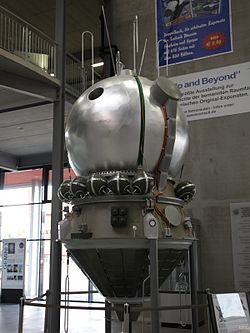SpaceX Crew-10
| SpaceX Crew-10 | |||
 | |||
| Statistik för uppdraget | |||
|---|---|---|---|
| Modell | Dragon 2 | ||
| Beställare | NASA | ||
| Operatör | SpaceX | ||
| Farkostens namn | Endurance | ||
| Uppskjutning | |||
| Raket | Falcon 9 Block 5 | ||
| Uppskjutningsramp | Kennedy LC-39A | ||
| Uppskjutning | 14 mars 2025, 23:03:48 UTC[1] | ||
| Omloppsbana | |||
| Grader | 51,6° | ||
| Dockning | |||
| Rymdstation | ISS | ||
| Dockning | 16 mars 2025, 04:04:52 UTC | ||
| Port | PMA-2/IDA-2 (Harmony, fram) | ||
| Besättning | |||
| Befälhavare | Anne McClain (2) | ||
| Pilot | Nichole Ayers (1) | ||
| Uppdragsspecialister | Takuya Onishi (2) Kirill Peskov (1) | ||
| Kronologi | |||
| |||
SpaceX Crew-10 är uppdragsbeteckningen för en bemannad rymdfärd med en Dragon 2-rymdfarkost från SpaceX. Farkosten sköts upp med en Falcon 9-raket från Kennedy Space Center LC-39A den 14 mars 2025. Flygningens destination är den Internationella rymdstationen (ISS).[1]
Farkosten dockade med rymdstationen den 16 mars 2025.
Besättning
| Befälhavare | Hennes andra rymdfärd |
|---|---|
| Pilot | Hennes första rymdfärd |
| Flygingenjör 1 | Hans andra rymdfärd |
| Flygingenjör 2 | Hans första rymdfärd |
Backup
| Flygingenjör 2 |
|---|
Källor
- ^ [a b] ”NASA’s SpaceX Crew-10” (på engelska). NASA. 2 mars 2025. https://www.nasa.gov/event/nasas-spacex-crew-10-launch/. Läst 5 mars 2025.
| ||||||||||||||||||||||||||||||||||||||||||||||||||||||||
| |||||||||||||||||||||||||||||||
| ||||||||||||||||||||||||||||||||
Media som används på denna webbplats
In this illustration, a SpaceX Crew Dragon spacecraft approaches the International Space Station for docking. NASA is partnering with Boeing and SpaceX to build a new generation of human-rated spacecraft capable of taking astronauts to the station and expanding research opportunities in orbit. SpaceX's upcoming Demo-1 flight test is part of NASA’s Commercial Crew Transportation Capability contract with the goal of returning human spaceflight launch capabilities to the United States.
Författare/Upphovsman: SpaceX, Licens: CC0
This artist's concept shows a SpaceX Crew Dragon docking with the International Space Station as it will during a mission for NASA's Commercial Crew Program. NASA is partnering with Boeing and SpaceX to build a new generation of human-rated spacecraft capable of taking astronauts to the station and expanding research opportunities in orbit.
Författare/Upphovsman: Pascal (Flickr user: pasukaru76), Licens: CC0
Vostok spacecraft replica at the Technik Museum Speyer, Germany.
NASA's insignia for SpaceX's Crew-10 mission to the International Space Station with NASA astronauts Anne McClain and Nichole Ayers, JAXA astronaut Takuya Onishi and Roscomsos cosmonaut Kirill Peskov. The 10-sided patch has the roman numeral X in the center with a Dragon, also the capsule's namesake, with wings out in full flight to represent the four professional pilots that make up the crew. The red, white, and blue stars are the flag colors of each crew members' home country, and the brightest stars represent the crew's closest family members and support system.
Backdropped by a blue and white Earth, this close-up view features the Soyuz TMA-6 spacecraft approaching the International Space Station (ISS). Onboard the spacecraft are cosmonaut Sergei K. Krikalev, Expedition 11 commander representing Russia's Federal Space Agency; astronaut John L. Phillips, NASA ISS science officer and flight engineer; and European Space Agency (ESA) astronaut Roberto Vittori of Italy. The Soyuz linked to the Pirs Docking Compartment at 9:20 p.m. (CDT) on April 16, 2005 as the two spacecraft flew over eastern Asia. The docking followed Friday’s launch from the Baikonur Cosmodrome in Kazakhstan.
Författare/Upphovsman: Space Exploration Technologies Corp., Licens: CC0
The 2018 version of the Big Falcon Rocket at stage separation: Starship (foreground) and Super Heavy (background)
Rotated and color enhanced version of original (ISS013-E-48788 (6 July 2006) --- The Space Shuttle Discovery approaches the International Space Station for docking but before the link-up occurred, the orbiter went through a series of inspection photos by station crew to inspect the vehicle for any damage to its Thermal Protection System. This was known as the Rendezvous Pitch Maneuver and was implemented after the Columbia Disaster in 2003. The Leonardo Multipurpose Logistics Module can be seen in the shuttle's cargo bay. Discovery docked at the station's Pressurized Mating Adapter 2 at 9:52 a.m. CDT, July 6, 2006.)













